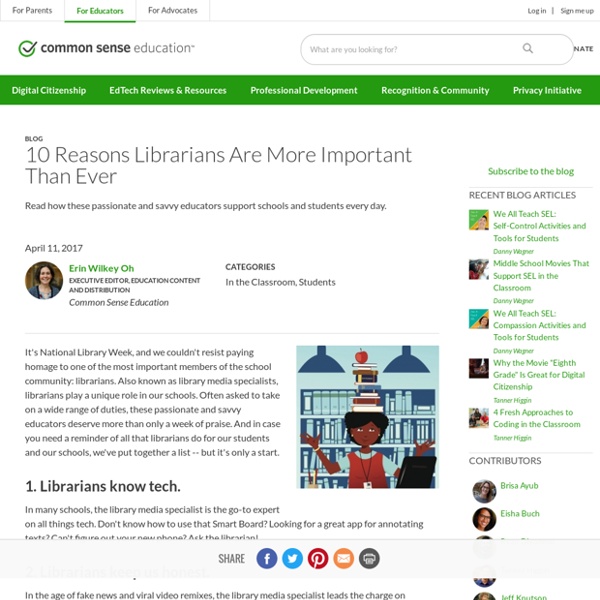Don't worry, a school library with fewer books and more technology is good for today's students
A recent article about a new approach to a school library sparked vigorous discussion on social media. Many worried the school had completely abolished traditional library services. The article describes how a Melbourne school changed its library to a technology-focused centre staffed by “change adopters” who host discussions with students and encourage creative thinking.
HyperDocs and the teacher librarian
The concept of HyperDocs is spreading all over edtech land. HyperDocs are perfect opportunities to grow teacher librarian/ classroom teacher partnerships. A true extension of what TLs do or should be doing in a hyperlinked information landscape, HyperDocs are all about curation and collaboration, instruction based on engaged inquiry, as well as our mission to inspire learning communities to think, create, share and grow.
Library staples: what people really want from their libraries!
Let’s call it the Apple Store Agenda, an environment where you can relax, use the gizmos and gadgets, get online or take a class without anyone hassling you or being too invasive. Thanks to pioneers such as Apple, Google and the like, the world’s now filled to the brim with modern day consumers who have expectations - expectations that the basic staples will always be available to them, and they will be of a certain quality. What does that mean to anyone wanting to attract a new audience into their world or space?
Transliteracies and Libraries
Good school libraries value the social, distributed nature of meaning making. Good school libraries facilitate the mobility of people and things. In this spirit, they are natural sites for nurturing transliteracies. In the current issue of the Journal of Literacy Research, Amy Stornaiuolo, Anna Smith, and Nathan C.
Ten ways to advocate for your role as a teacher librarian
You can offer to support the program with physical resources, curated website collections, core text suggestions, research skills that you can teach — the opportunities are endless. Your broad knowledge of learning across the school can contribute to curriculum mapping, connecting the work of individual subjects to facilitate interdisciplinary teaching opportunities. 5. Gain support from leadership You can find a supporter among the school leadership team who understands your vision to improve student outcomes across the school. You don’t need to always do all the advocating yourself; you can ask them to assist you in advocating for the role of the library in the school.
Why We Still need Bookshops and Librairies in the Internet Age
Dare the question: do we really need bookstores (or even libraries) today? In theory, no. If you’re in search of a book a simple click on the Internet can satisfy it: within 24 hours it is delivered in your mailbox.
Mrs. ReaderPants: Top 10 Reasons Secondary Students Need Regular Library Time
This has been the case in every secondary library I've observed, visited, and attended back in the 1990s. My question is...why is that? Why do elementary students get to enjoy library every week, but middle school students depend on their teacher to schedule time in the library? Why? In the past few days, I've seen three posts on LM_Net, a huge librarian listserv, from secondary librarians looking for strategies to encourage teachers to bring their students into the library more often.
Print your own masterpieces and digital pens
People can now access much of Sydney’s Museum of Applied Arts and Sciences’ extensive collection online. High-resolution images of more than 130,000 objects are available for viewing on a new, mobile-friendly collections website. The Museum, which includes the Powerhouse Museum, is one of a host around the world making their collections and data available for free public use. My research investigates the different ways – from digital pens to crowd-sourced exhibitions – museums are meeting their audiences’ changing expectations. Make your own path
Are librarians the key to a Future Ready school?
According to the U.S. Department of Education’s Office of Education Technology, librarians are at the forefront of helping schools become future ready. However, too often librarians are left out of the planning process for infrastructure and devices, professional learning for teachers, and digital content strategies—areas where they often have expertise. The Alliance for Excellent Education (the Alliance) launched its Future Ready Schools (FRS) initiative in October 2014 with the aim of leveraging technology and connectivity to personalize and transform learning. In June 2016, the Alliance, in partnership with the U.S. Department of Education’s Office of Educational Technology, expanded FRS to position school librarians as leaders in this effort.
School Library Journal
Visionary school leaders and superintendents are reinventing school libraries, highlighting their key role in student learning and literacy. From left: Superintendents Warren Drake and Pam MoranFrom Left: Photo courtesy of East Baton Rouge Parish School System; photo by Cale Elem librarian Anna Balasz Thomas S.



